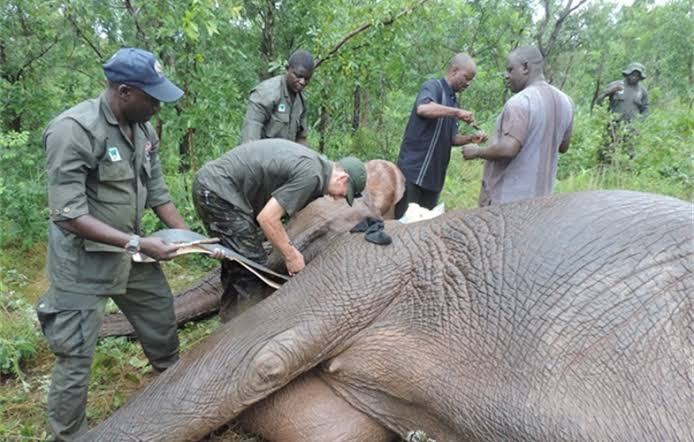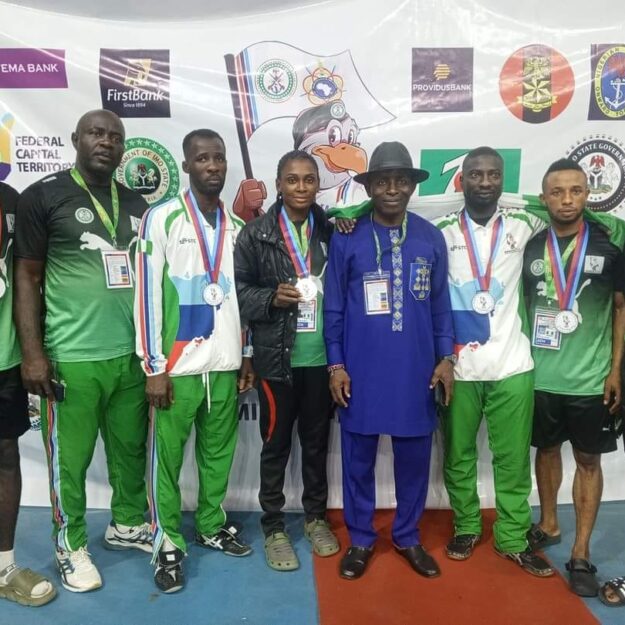
In early October, the Wildlife Conservation Society (WCS) fitted six elephants in northern Nigeria’s Yankari National Park with satellite collars. The collars will help WCS, which works with the Bauchi state government to manage the park, better monitor and protect Nigeria’s largest remaining herd of elephants.
“The elephants’ collars are quite valuable, not just for protection and for research, but also to reduce human-elephant conflict and promote tourism,” Andrew Dunn, Nigeria director of WCS, told Mongabay.
“It will allow us to know where the elephants are and to make sure our rangers know where they are, watch them closely and make sure the elephants get close protection.”
Dunn said rangers can now track the elephants’ movements and location better and react more quickly when the elephants are in danger or move closer to the edge of the park.
Elephants once ranged from the tropical swamps and rainforests of the south of Nigeria to the savanna in the north, but a combination of poaching, human-elephant conflict, and deforestation from logging for timber and expanding agriculture have diminished these populations.
Water buck (Kobus ellipsiprymnus) at Yankari: the park is also home to buffalo, tantalus and patas monkeys, roan antelope, hartebeest, and lions. Image by Charles Emogor via Wikimedia Commons (CC BY-SA 4.0)
Water buck (Kobus ellipsiprymnus) at Yankari: the park is also home to buffalo, tantalus and patas monkeys, roan antelope, hartebeest, and lions. Image by Charles Emogor via Wikimedia Commons (CC BY-SA 4.0)
Designated as a game reserve in 1956, Yankari was managed by regional authorities until it was designated a national park in 1991. In 2006, responsibility for the park was transferred to the government of Bauchi state, where it’s located. At the time, the elephant population was estimated at up to 350, but between 2006 and 2015 the reserve suffered intense poaching and the number of elephants fell sharply.
“During this terrible period,” Dunn said, “Yankari was probably losing 20 to 30 elephants per year.”
This period coincided with a wave of poaching across the continent, which saw elephant populations decline by around 111,000 across Africa. Some 415,000 elephants can be found in 37 range countries in the continent now. Survey data for Nigeria is inadequate, but the IUCN’s 2016 African elephant status report estimated the country’s remaining population at somewhere between 169 and 463.
Around 100 savanna elephants (Loxodonta africana), one of the two species of elephants found in Nigeria, live in the 2,244-square-kilometer (866-square-mile) Yankari park, making it the largest and most viable herd in the country. Smaller populations of forest elephants (Loxodonta cyclotis) can be found in the Omo Forest Reserve, Okomu National Park, and Cross River National Park in southern Nigeria. Yankari also provides a sanctuary for other wildlife, including lions (the genetically distinct West African lion is regarded as critically endangered, and just two small populations remain in Nigeria) as well as buffalo, hippopotamus, roan antelope and hartebeest.
While investments were made in the reserve’s main tourist camp after the Bauchi state takeover in 2006, authorities found management of the protected area a challenge. A lack of resources left rangers underpaid, poorly trained and ill-equipped with vehicles or firearms needed to fight off organized, well-armed elephant poachers. Communities around the reserve, often angered by destruction of crops by elephants straying outside the park’s boundaries, were hostile to rangers.
The signing of a co-management agreement with WCS in 2014 brought welcome expertise and additional resources to the park. With support from the U.S. Fish and Wildlife Service, the Lion Recovery Fund and the Elephant Crisis Fund, WCS provided rangers with training, field equipment and rations, camping allowances, and cash bonuses for arresting poachers. With increased frequency and coverage, ranger patrols were able to deter hunting, grazing and poaching.
WCS also hired a team of “elephant guardians” from neighboring villages and gave them cellphones to serve as an early warning system whenever elephants strayed outside the reserve.
“The health of Yankari elephants is now good. They are reproducing and hunting has been stopped, so definitely they will increase — but it will take time for them to fully recover,” Dunn told Mongabay.
There have been no documented killings of elephants in Yankari since May 2015.
“It is a huge progress because poaching has been much of a problem in the past,” says Modibbo Ahmed, the Bauchi state commissioner for tourism and culture.
You may be interested
CAFCC: Olanrewaju Explains Enyimba’s Switch To Uyo Grass Pitch Ahead Al-Masry Clash
Webby - November 23, 2024Yemi Olanrewaju, Head Coach of Enyimba, has explained to Completesports.com the rationale behind the team’s relocation to the Godswill Akpabio…

Boniface Can Still Play This Year — Leverkusen Boss Alonso
Webby - November 23, 2024Bayer Leverkusen manager Xabi Alonso remains optimistic Victor Boniface will return to action for the club before the end of…

Spurs Striker Dominic Solanke Hopes To Visit Nigeria Soon
Webby - November 23, 2024Ahead of the mega clash between Manchester City and Tottenham Hotspur this weekend, Tottenham Hotspur forward Dominic Solanke has opened…




















![American Pastor, David Wilson Seen Eating The Box Of Woman Who Isn’t His Wife [Video]](https://onlinenigeria.com/wp-content/uploads/2019/10/american-pastor-david-wilson-seen-eating-the-box-of-woman-who-isnt-his-wife-video-150x150.jpg)









